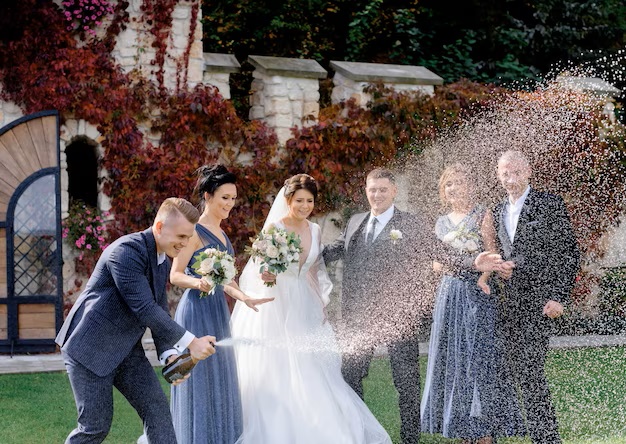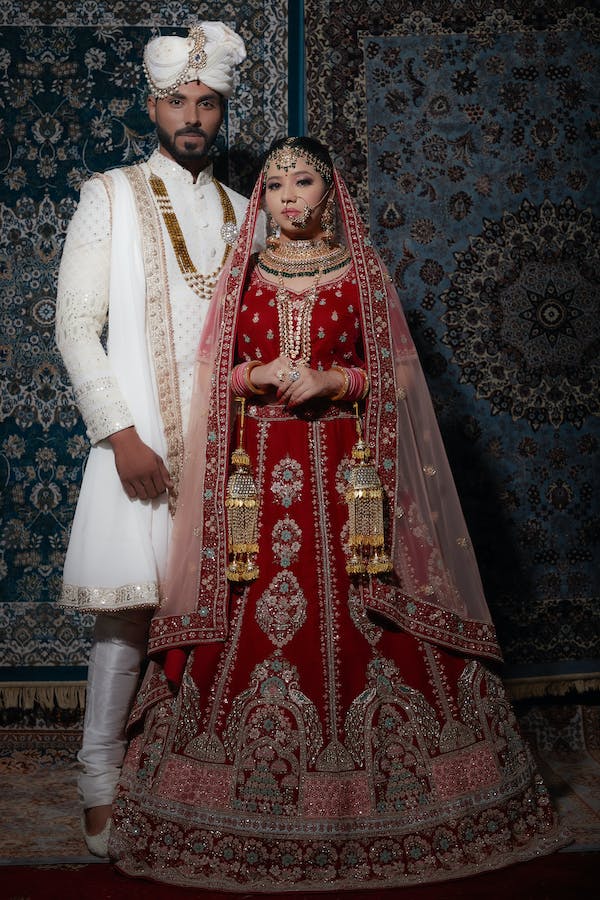Healthy Foundations for Lasting Marital Bliss

The institution of marriage is a profound union, symbolizing the amalgamation of two lives, two souls, and two destinies. It is a lifelong journey marked by profound experiences, trials, and moments of joy. At its core, a strong foundation serves as the bedrock upon which enduring marital bliss is built. In this discussion, we delve into the significance of a robust foundation in marriage and why it is a shared aspiration for countless couples.
A solid foundation in marriage, akin to the firm footing of a well-constructed building, provides the essential support necessary for a harmonious and enduring partnership. It encompasses the core principles and practices that fortify the connection between two individuals, empowering them to navigate the myriad challenges and joys that life presents. Lasting marital bliss is a cherished goal, an aspiration that springs from the human yearning for companionship, love, and shared happiness. By understanding the elements of a healthy foundation and the reasons behind our shared desire for lasting happiness in marriage, we embark on a journey towards deeper insight and, ultimately, a more fulfilling partnership.
Communication: The Cornerstone of a Happy Marriage
Effective communication serves as the bedrock of a thriving and harmonious marriage. It’s the lifeblood that sustains the connection between two individuals, fostering understanding, empathy, and unity. In this discussion, we explore the vital role of communication in achieving lasting marital bliss, focusing on its significance as a key foundation, the art of active listening and open dialogue, and the constructive management of conflicts.
Communication, as a key foundation, enables partners to articulate their thoughts, emotions, and needs. It builds a bridge between their inner worlds, ensuring that they’re on the same page and working towards shared goals. When partners listen actively and engage in open dialogue, they create a safe space for each other to express themselves honestly. This, in turn, fosters trust, deepens emotional intimacy, and strengthens the marital bond.
Additionally, mastering the art of managing conflicts constructively is essential in any marriage. Conflicts are inevitable, but how they are resolved can either fortify or weaken the relationship. Constructive conflict management involves approaching disagreements with empathy, patience, and a shared goal of resolution. It transforms conflicts into opportunities for growth, learning, and greater understanding.
In essence, the cornerstone of a happy marriage is effective communication, encompassing active listening, open dialogue, and the ability to navigate conflicts with grace. By honing these skills, couples can build a robust foundation for enduring marital bliss, ensuring that their connection remains strong and resilient throughout the journey of life together.



Trust and Transparency

Trust and transparency are the pillars upon which a strong, enduring marriage stands. They form the essence of a bond built on mutual respect, integrity, and unwavering support. In this discussion, we delve into their pivotal roles in marital bliss, exploring how trust is built and maintained, the significance of honesty and transparency, and the delicate process of rebuilding trust after it has been breached.
Building trust and maintaining it are continuous endeavors that demand consistency and reliability. Trust is established when partners consistently keep their promises, demonstrate reliability, and show that they can be counted on. Maintaining trust involves upholding these qualities, ensuring that the foundation of the relationship remains solid and secure.

Honesty and transparency are essential components of trust. They foster open, genuine communication, creating a safe space where partners can express their thoughts, feelings, and concerns without fear of judgment. Honesty is the keystone that underpins trust, while transparency ensures that no shadows obscure the truth.
Sometimes, trust may be tested, and breaches can occur. Rebuilding trust is a delicate process that requires acknowledgment of the breach, sincere apologies, and a shared commitment to healing. It often involves demonstrating change through actions that align with promises made.
Trust and transparency are not static elements but dynamic forces that require attention and care. They provide the bedrock upon which lasting marital bliss is built, assuring couples that their relationship is based on honesty, reliability, and unwavering support.


Emotional Intimacy
Emotional intimacy is the invisible thread that binds two individuals in a marriage, creating a profound connection that transcends the physical realm. It is the heartbeat of lasting marital bliss, facilitating an understanding of each other’s emotions, nurturing deep connections, and providing unwavering empathy and support. In this discussion, we explore the significance of emotional intimacy, starting with understanding the essence of emotional connection, the art of nurturing it, and the crucial role that empathy and support play in maintaining this intimate bond.
Understanding emotional connection entails recognizing the emotional needs and vulnerabilities of both partners. It involves the ability to share one’s innermost thoughts, fears, and dreams without fear of judgment. True emotional connection thrives on the belief that a partner can be trusted with one’s deepest emotions and feelings.
Nurturing emotional intimacy is an ongoing process that requires time, effort, and genuine care. It involves checking in with your partner regularly, showing appreciation and understanding, and being a shoulder to lean on during both moments of joy and adversity.
The importance of empathy and support cannot be overstated in sustaining emotional intimacy. Empathy allows you to step into your partner’s shoes, experiencing their emotions as if they were your own. Offering support, both in words and actions, during their highs and lows, strengthens the emotional bond.
In essence, emotional intimacy is the heartbeat of a thriving marriage, fostering deep connections and mutual understanding. It is the beacon that guides couples towards lasting marital bliss, ensuring that they continue to share their deepest emotions, support each other, and grow together as a loving, emotionally connected unit.
Financial Compatibility

Money, a potent force in our lives, significantly impacts the dynamics of a marriage. Financial compatibility is a critical aspect of lasting marital bliss, involving not only the management of monetary resources but also the alignment of financial values and goals. In this discussion, we delve into why money matters in marriage, the importance of budgeting and financial planning as a team, and how to address and resolve financial conflicts constructively.
Financial matters, though often considered mundane, hold the potential to either strengthen or strain a marital relationship. Money serves as a means to achieve shared goals, fulfill aspirations, and provide for the future. Therefore, it’s crucial for couples to see eye to eye when it comes to financial values and expectations.
Budgeting and financial planning together foster collaboration and ensure that both partners have a say in how resources are allocated. This cooperative effort encourages transparency, trust, and shared responsibility. By creating a budget and setting financial goals together, couples can work towards their aspirations in unison.
Addressing financial conflicts is a vital skill in maintaining financial compatibility. Disagreements related to spending, saving, or investment decisions are common. Open, non-confrontational communication and compromise are essential in resolving these conflicts, ensuring that both partners feel heard and valued.
Financial compatibility is the foundation of a harmonious marriage. It involves aligning financial values, budgeting and planning together, and addressing conflicts constructively. By navigating money matters as a team and working towards shared financial goals, couples can build a strong foundation for lasting marital bliss, strengthening their partnership and securing their financial future together.



Shared Goals and Dreams
In the tapestry of marriage, shared goals and dreams are the vibrant threads that interweave two lives into a harmonious and fulfilling partnership. The power of having shared aspirations is immeasurable, as it brings depth and purpose to the union. In this discussion, we explore the significance of shared goals and dreams, the art of setting and achieving common objectives, and the delicate balance between individual and joint dreams.
Shared aspirations provide couples with a sense of purpose and unity. When two individuals share common goals and dreams, it aligns their focus and efforts, creating a shared vision for their life together. This shared vision propels them towards a future of mutual fulfillment and accomplishment.
Setting and achieving common goals is a testament to the strength of a marriage. It involves identifying aspirations, creating a plan, and working together to make them a reality. Celebrating these joint achievements enhances the sense of togetherness and shared accomplishment.
Balancing individual and joint dreams is an art in itself. While shared aspirations are vital, it’s equally important to respect and support each other’s individual goals. The delicate balance between individual and joint dreams allows for personal growth within the confines of a loving and supportive partnership.
Shared goals and dreams are the cornerstone of a thriving marriage. They provide a shared purpose and vision, creating a stronger bond between partners. By nurturing a balance between individual and joint dreams and working together to achieve common objectives, couples can enjoy a fulfilling and harmonious journey through life.
Quality Time and Romance

In the symphony of marriage, quality time and romance play the role of melodious notes that infuse joy, affection, and intimacy into the relationship. They are the elements that keep the flames of love burning brightly. In this discussion, we explore the importance of keeping the romance alive, the significance of spending quality time together, and the delightful world of romantic gestures and surprises.
Keeping the romance alive is a conscious effort that requires affectionate gestures, words, and actions. As time goes on, it’s easy to become complacent, but actively nurturing the romantic aspect of the relationship ensures that love remains vibrant. It involves consistent acts of appreciation, affection, and maintaining the spark of passion.
Spending quality time together is the foundation of a close and loving partnership. It’s not just about the quantity of time but the quality. Engaging in meaningful activities, having deep conversations, and cherishing shared moments create a bond that’s unbreakable. Quality time allows couples to connect on a deeper level, fostering intimacy and emotional closeness.
Romantic gestures and surprises are the sweet cherries on top of the marital cake. Thoughtful, unexpected acts of love remind partners of their affection and devotion. From love notes and spontaneous weekend getaways to surprise gifts and romantic dinners, these gestures keep the relationship exciting and show appreciation for one another.
Quality time and romance are the heartbeat of a thriving marriage. By making a conscious effort to keep the romance alive, prioritizing quality time together, and indulging in romantic gestures and surprises, couples can ensure that their love remains fresh, vibrant, and everlasting.
Mutual Respect and Boundaries

In the tapestry of marriage, mutual respect and well-defined boundaries form the intricate threads that weave a relationship of harmony and understanding. They are the underpinnings of a strong and lasting partnership. In this discussion, we delve into the pivotal role of mutual respect as the foundation of a marriage, the importance of setting healthy boundaries, and the art of balancing individual needs with the needs of the relationship.
Mutual respect serves as the cornerstone of a successful marriage. It embodies a deep understanding and acknowledgment of each partner’s worth, opinions, and autonomy. Respect lays the foundation for open, considerate communication, creating an environment of trust and equality.
Setting healthy boundaries is essential for the well-being of both partners and the relationship itself. Boundaries define personal space and autonomy, allowing individuals to maintain their identities within the union. They also help prevent conflicts and misunderstandings, as well as ensure that both partners feel safe and valued.
Balancing individual needs and the needs of the relationship is a delicate act of harmonizing personal aspirations and collective goals. Striking this equilibrium involves understanding that both partners have their individual wants and needs, but they also share common objectives and responsibilities. It calls for empathy, compromise, and mutual support.
Mutual respect and well-defined boundaries are the cornerstones of a thriving marriage. They create a sense of security and appreciation, allowing couples to communicate openly, maintain individual identities, and support one another’s growth. By fostering mutual respect and setting healthy boundaries while balancing individual needs with the needs of the relationship, couples can build a sturdy foundation for a harmonious and lasting partnership.
Supporting Each Other's Personal Growth
In the narrative of marriage, the chapter of personal growth is a testament to the evolution of two individuals as they navigate life’s journey together. Supporting each other’s personal growth is not just a commitment but a foundation for a thriving relationship. In this discussion, we explore the significance of encouraging personal development, the beauty of being partners in each other’s growth, and the delicate balance between independence and togetherness.
Encouraging personal development involves recognizing that each partner’s growth is essential to the well-being of the relationship. It means fostering an environment in which both individuals can pursue their passions, dreams, and aspirations. Supporting personal development requires being each other’s cheerleaders, offering guidance, and nurturing the pursuit of individual goals.
Being partners in each other’s growth is a beautiful aspect of a flourishing marriage. It’s about actively participating in the journey of self-improvement, providing unwavering support and understanding. Being there for each other during the highs and lows of personal development strengthens the marital bond, as couples evolve together.
Balancing independence and togetherness is an art that keeps the relationship resilient. It means allowing each partner the space to pursue personal growth while maintaining a strong connection as a couple. Striking this balance requires communication, trust, and understanding.
supporting each other’s personal growth is the key to a thriving marriage. Encouraging personal development, being partners in each other’s growth, and maintaining a balance between independence and togetherness create a relationship that is nurturing, resilient, and continuously evolving. Couples who support each other’s individual growth build a love that not only endures but also thrives.



Coping with Challenges

Marriage is a journey marked not only by joyous moments but also by trials and tribulations. Coping with challenges is an essential aspect of maintaining a resilient and thriving partnership. In this discussion, we explore the strategies for dealing with external challenges, overcoming internal struggles, and the importance of seeking professional help when needed.
Coping strategies for external challenges are crucial in fortifying a marriage against the unpredictable storms of life. Whether it’s facing external factors such as career changes, financial crises, or health issues, a united front is essential. Working together as a team, openly discussing the challenges, and jointly finding solutions can help couples navigate through external obstacles.
Internal struggles, such as misunderstandings, unmet expectations, or emotional conflicts, can often be more challenging to overcome. Effective communication, empathy, and understanding are key in resolving these internal struggles. Couples who are committed to growth and understanding can transform internal challenges into opportunities for deeper connection and personal development.
Seeking professional help is a wise step when challenges seem insurmountable. Marriage counselors or therapists provide an objective perspective and the tools needed to navigate complex issues. Asking for professional guidance demonstrates a commitment to the relationship’s well-being and can lead to breakthroughs in understanding and growth.
coping with challenges is an integral part of a thriving marriage. By employing effective strategies for external challenges, working together to overcome internal struggles, and seeking professional help when necessary, couples can navigate the journey of marriage with resilience, gaining strength from each challenge they overcome together.



The Role of Family and Friends
In the tapestry of marriage, the influence of family and friends weaves both joy and complexity into the relationship. Navigating the role of family and friends is vital for a harmonious partnership. In this discussion, we explore the art of balancing connections with family and friends, handling in-law relationships with grace, and the importance of seeking advice when necessary.
Balancing the presence of family and friends in your marriage requires finesse. While these relationships are valuable, it’s important to maintain boundaries that protect the sanctity of the marital bond. Communication is key, allowing couples to set expectations and find common ground that respects both individual connections and the marriage itself.
Handling in-law relationships is a significant aspect of married life. Approach these relationships with open communication, respect, and empathy. Conflicts with in-laws should be addressed with patience and understanding, seeking solutions that prioritize the well-being of the marriage.
Seeking advice when necessary is a sensible approach to addressing complex issues. Trusted family members and friends can offer guidance, and sometimes, professional advice from therapists or counselors is invaluable. The willingness to seek advice demonstrates a commitment to finding solutions and maintaining a healthy, thriving marriage.
The role of family and friends in marriage is multi-faceted. Balancing these connections, handling in-law relationships with respect, and seeking advice when needed contribute to a resilient and harmonious marital journey. Couples who navigate these dynamics with grace and open communication ensure that their marriage remains a thriving, cherished, and enduring partnership.
FAQ
Q1: What is the key foundation for lasting marital bliss?
A1: Effective communication serves as the cornerstone for lasting marital bliss. Open, honest, and respectful communication nurtures understanding and fosters a strong, healthy connection.
Q2: How can couples overcome financial conflicts to maintain a harmonious marriage?
A2: Budgeting and financial planning together is a solution to financial conflicts. By working as a team and setting common financial goals, couples can manage their money effectively and reduce financial stress.
Q3: What role does emotional intimacy play in a lasting marriage?
A3: Emotional intimacy is crucial. It deepens the emotional bond between partners and fosters a sense of closeness and support. It’s achieved through open communication, empathy, and nurturing emotional connections.
Q4: How can couples balance individual growth with togetherness in a marriage?
A4: Balancing individual and joint dreams is vital. Partners should encourage each other’s personal development while respecting the shared goals and aspirations that strengthen the relationship.
Q5: When should couples seek professional help to address marital challenges?
A5: Couples should consider seeking professional help when conflicts seem insurmountable, or they face significant challenges. Marriage counselors or therapists can provide valuable guidance and strategies for resolution.
conclusion
The foundations for lasting marital bliss are the essential building blocks that ensure a relationship stands strong against the tests of time. Effective communication, trust, emotional intimacy, financial compatibility, shared goals, quality time, mutual respect, support for personal growth, and the ability to cope with challenges together create a harmonious partnership. Encouraging continuous growth, not just as individuals but as a couple, is pivotal for enduring happiness. The commitment to nurturing these foundations ensures that love remains vibrant and the journey of marriage continues to be a fulfilling and enriching experience, marked by deep connection, understanding, and unwavering love.

